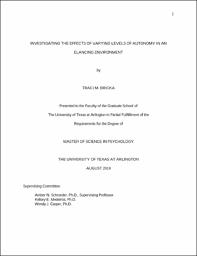
ATTENTION: The works hosted here are being migrated to a new repository that will consolidate resources, improve discoverability, and better show UTA's research impact on the global community. We will update authors as the migration progresses. Please see MavMatrix for more information.
Show simple item record
| dc.contributor.advisor | Schroeder, Amber N. | |
| dc.creator | Bricka, Traci M. | |
| dc.date.accessioned | 2019-08-27T16:46:07Z | |
| dc.date.available | 2019-08-27T16:46:07Z | |
| dc.date.created | 2019-08 | |
| dc.date.issued | 2019-08-01 | |
| dc.date.submitted | August 2019 | |
| dc.identifier.uri | http://hdl.handle.net/10106/28573 | |
| dc.description.abstract | Whereas there is a plethora of research on the work outcomes of standard employees (i.e., individuals who work full-time at one organization and complete work specified by the employer at their established place of business under the assumption of long-term employment; Broschak & Davis-Blake, 2006), there is a scarce amount of research investigating factors impact the outcomes of nonstandard employees (i.e., individuals who conduct any type of work that differs from standard work; Ashford, George, & Blatt, 2007). As these work environments are highly discrepant, there is a need for research concentrating on nonstandard employees. This study built upon Job Characteristics Theory by investigating the effects of autonomy on online nonstandard employee (i.e., eLancer) outcomes (i.e., performance and satisfaction), as well as the mediating mechanisms of felt responsibility, meaningfulness, and effort. Although an experimental autonomy manipulation did not produce the expected effects, results indicated that perceptions of autonomy predicted felt responsibility for the task, but not reported task meaningfulness. In turn, both felt responsibility and meaningfulness predicted increased effort, which was positively related to task satisfaction and performance. Additionally, preference for autonomy moderated the relationship between perceptions of autonomy and felt responsibility, such that as preference for autonomy increased, the relationship between perceived autonomy and felt responsibility weakened, which was contrary to expectations. These results suggest that perceptions of task autonomy are influential in determining eLancer responsibility, effort, and work outcomes. The findings of this study highlight how perceived autonomy in eLance work can play a role in determining job performance and job satisfaction. | |
| dc.format.mimetype | application/pdf | |
| dc.language.iso | en_US | |
| dc.subject | Nonstandard employment | |
| dc.subject | eLancing | |
| dc.subject | Autonomy | |
| dc.title | Investigating the Effects of Varying Levels of Autonomy in an eLancing Environment | |
| dc.type | Thesis | |
| dc.degree.department | Psychology | |
| dc.degree.name | Master of Science in Psychology | |
| dc.date.updated | 2019-08-27T16:46:07Z | |
| thesis.degree.department | Psychology | |
| thesis.degree.grantor | The University of Texas at Arlington | |
| thesis.degree.level | Masters | |
| thesis.degree.name | Master of Science in Psychology | |
| dc.type.material | text | |
Files in this item
- Name:
- BRICKA-THESIS-2019.pdf
- Size:
- 691.6Kb
- Format:
- PDF
This item appears in the following Collection(s)
Show simple item record


